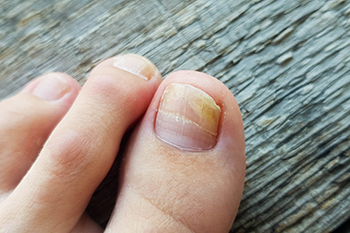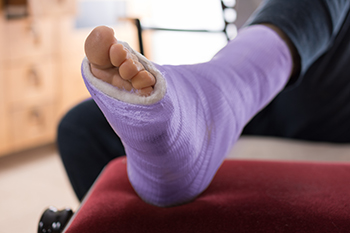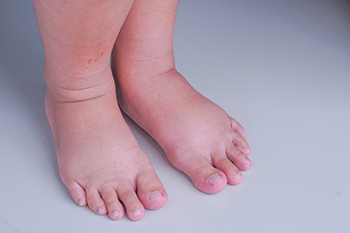January 2024
Reasons for Swollen Feet During Pregnancy

Swollen feet are a common companion to the miraculous journey of pregnancy, stemming from a combination of physiological changes and increased demands on the circulatory system. As the body nurtures a growing life within, blood volume surges, causing fluid retention in various tissues, including the feet. Hormonal shifts play a pivotal role, promoting relaxation of blood vessels and allowing for increased fluid accumulation. The expanding uterus exerts pressure on major blood vessels, hindering efficient circulation and contributing to swelling in the lower extremities. Prolonged standing or sitting can exacerbate this swelling, emphasizing the importance of regular movement and elevation of the feet. While edema during pregnancy is typically benign, it is essential to distinguish it from conditions like preeclampsia. If your feet become swollen during your pregnancy, it is suggested that you speak to a podiatrist who can offer you effective relief methods.
Pregnant women with swollen feet can be treated with a variety of different methods that are readily available. For more information about other cures for swollen feet during pregnancy, consult with Brian D. Jackson, DPM from Neuhaus Foot and Ankle. Our doctor will attend to all of your foot and ankle needs.
What Foot Problems Can Arise During Pregnancy?
One problem that can occur is overpronation, which occurs when the arch of the foot flattens and tends to roll inward. This can cause pain and discomfort in your heels while you’re walking or even just standing up, trying to support your baby.
Another problem is edema, or swelling in the extremities. This often affects the feet during pregnancy but tends to occur in the later stages.
How Can I Keep My Feet Healthy During Pregnancy?
- Wearing orthotics can provide extra support for the feet and help distribute weight evenly
- Minimize the amount of time spent walking barefoot
- Wear shoes with good arch support
- Wear shoes that allow for good circulation to the feet
- Elevate feet if you experience swelling
- Massage your feet
- Get regular, light exercise, such as walking, to promote blood circulation to the feet
If you have any questions please feel free to contact one of our offices located in Columbia and Pulaski, TN . We offer the newest diagnostic and treatment technologies for all your foot and ankle needs.
Common Sources of Foot Pain

For most people over the age of 50, foot pain is a common experience, affecting approximately 20 percent of older adults. Contributing factors include excess weight, inappropriate footwear, and the natural wear and tear associated with aging. However, it is essential not to dismiss foot pain, as research suggests it can compromise balance and foot function, and increase the risk of falls. Distinguishing between muscle soreness from activity and sharp pain originating from bones or joints is important. If experiencing the latter, seeking help from a medical professional is imperative. Several types of foot pain warrant such attention. Stress fractures, prevalent in older adults, manifest as pain during activity that subsides with rest. Persistent heel pain, such as plantar fasciitis, may require evaluation from a podiatrist if it persists despite rest. Psoriatic arthritis, characterized by joint pain and swelling, often accompanied by psoriasis symptoms, requires attention. Neuropathy, frequently linked to diabetes but with various causes, demands investigation for symptoms like tingling, burning, or foot numbness. If you are experiencing persistent or sharp foot pain it is suggested that you schedule an appointment with a podiatrist for a diagnosis and tailored treatment plan.
Foot Pain
Foot pain can be extremely painful and debilitating. If you have a foot pain, consult with Brian D. Jackson, DPM from Neuhaus Foot and Ankle. Our doctor will assess your condition and provide you with quality foot and ankle treatment.
Causes
Foot pain is a very broad condition that could be caused by one or more ailments. The most common include:
- Bunions
- Hammertoes
- Plantar Fasciitis
- Bone Spurs
- Corns
- Tarsal Tunnel Syndrome
- Ingrown Toenails
- Arthritis (such as Gout, Rheumatoid, and Osteoarthritis)
- Flat Feet
- Injury (from stress fractures, broken toe, foot, ankle, Achilles tendon ruptures, and sprains)
- And more
Diagnosis
To figure out the cause of foot pain, podiatrists utilize several different methods. This can range from simple visual inspections and sensation tests to X-rays and MRI scans. Prior medical history, family medical history, and any recent physical traumatic events will all be taken into consideration for a proper diagnosis.
Treatment
Treatment depends upon the cause of the foot pain. Whether it is resting, staying off the foot, or having surgery; podiatrists have a number of treatment options available for foot pain.
If you have any questions, please feel free to contact one of our offices located in Columbia and Pulaski, TN . We offer the newest diagnostic and treatment technologies for all your foot care needs.
Definition and Causes of Toenail Fungus

Onychomycosis, a common fungal infection affecting the nails, unveils itself as a condition that warrants a closer inspection. This ailment, known as a fungal nail infection, targets the toenails or fingernails, causing discoloration, thickening, and brittleness. The infection is often attributed to various fungal strains, primarily dermatophytes, but also yeasts and molds. These fungi thrive in warm and moist environments, making nails susceptible to infection when exposed to such conditions. Several factors contribute to the development of onychomycosis. Trauma to the nails, poor hygiene practices, and a compromised immune function elevate the risk. Additionally, communal spaces, such as public showers and swimming pools, serve as potential breeding grounds for the fungi, facilitating its transmission. If you have developed toenail fungus, it is strongly suggested that you confer with a podiatrist who can effectively treat this condition.
For more information about treatment, contact Brian D. Jackson, DPM of Neuhaus Foot and Ankle. Our doctor can provide the care you need to keep you pain-free and on your feet.
Toenail Fungus Treatment
Toenail fungus is a condition that affects many people and can be especially hard to get rid of. Fortunately, there are several methods to go about treating and avoiding it.
Antifungals & Deterrence
Oral antifungal medicine has been shown to be effective in many cases. It is important to consult with a podiatrist to determine the proper regiment for you, or potentially explore other options.
Applying foot powder on the feet and shoes helps keep the feet free of moisture and sweat.
Sandals or open toed shoes – Wearing these will allow air movement and help keep feet dry. They also expose your feet to light, which fungus cannot tolerate. Socks with moisture wicking material also help as well.
If you have any questions please feel free to contact one of our offices located in Columbia and Pulaski, TN . We offer the newest diagnostic tools and technology to treat your foot and ankle needs.
Treatment Options for Stress Fractures

Treatment options for stress fractures focus on promoting healing, managing pain, and preventing complications associated with these injuries. Stress fractures typically result from repetitive stress or overuse and require careful attention to facilitate recovery. Rest is a fundamental component, involving the reduction or avoidance of activities that led to the fracture, allowing the affected bone to heal without additional strain. In some cases, immobilization with the use of casts, braces, or walking boots may be necessary to support proper healing. Modifying weight-bearing activities can also alleviate stress on the fracture site, often requiring the use of crutches or assistive devices. Pain management strategies may involve medications to address discomfort and inflammation. Wearing custom orthotic devices or shoe inserts may offer better support and alignment for the affected area, reducing bone stress. Adjusting activity routines, incorporating appropriate warm-up and cool-down exercises, and avoiding excessive exertion are essential in preventing future stress fractures. A balanced diet with sufficient calcium and vitamin D supports bone health and healing. While surgery is rarely needed, it may be considered when conservative treatments prove ineffective at stabilizing the bone. If you have sustained a stress fracture in your feet or ankle, it is suggested that you schedule an appointment with a podiatrist for an evaluation and personalized treatment plan.
Stress fractures occur when there is a tiny crack within a bone. To learn more, contact Brian D. Jackson, DPM from Neuhaus Foot and Ankle. Our doctor can provide the care you need to keep you pain free and on your feet.
How Are They Caused?
Stress fractures are the result of repetitive force being placed on the bone. Since the lower leg and feet often carry most of the body’s weight, stress fractures are likely to occur in these areas. If you rush into a new exercise, you are more likely to develop a stress fracture since you are starting too much, too soon. Pain resulting from stress fractures may go unnoticed at first, however it may start to worsen over time.
Risk Factors
- Gender – They are more commonly found in women compared to men.
- Foot Problems – People with unusual arches in their feet are more likely to develop stress fractures.
- Certain Sports – Dancers, gymnasts, tennis players, runners, and basketball players are more likely to develop stress fractures.
- Lack of Nutrients – A lack of vitamin D and calcium may weaken the bones and make you more prone to stress fractures
- Weak Bones – Osteoporosis can weaken the bones therefore resulting in stress fractures
Stress fractures do not always heal properly, so it is important that you seek help from a podiatrist if you suspect you may have one. Ignoring your stress fracture may cause it to worsen, and you may develop chronic pain as well as additional fractures.
If you have any questions, please feel free to contact one of our offices located in Columbia and Pulaski, TN . We offer the newest diagnostic and treatment technologies for all your foot care needs.
Reminder: When Was the Last Time...?
Lymphoedema and Swelling of the Feet

Lymphoedema is a condition where the legs or feet swell due to fluid buildup because the body's lymphatic system, which functions similarly to veins, is struggling to remove it. This swelling is called edema and can happen when you do not move enough, such as after sitting for long periods during a flight. Persistent swelling of the feet, swelling that lasts over three months, is known as chronic edema, which suggests the beginning of lymphatic failure or early lymphoedema. If left untreated, chronic foot edema can cause skin changes, deeper tissue damage, and increase the risk of infections such as cellulitis. It is often associated with chronic venous insufficiency. Various factors can contribute to lymphoedema, including genetics, obesity, inactivity, vein problems, or damage from cancer treatments. Joint surgery may also impair lymphatic vessels, leading to lymphoedema. If you are experiencing swollen feet on a regular basis, it is suggested that you make an appointment with a podiatrist as quickly as possible to obtain treatment and prevent serious complications.
Swollen feet can be a sign of an underlying condition. If you have any concerns, contact Brian D. Jackson, DPM of Neuhaus Foot and Ankle. Our doctor can provide the care you need to keep you pain-free and on your feet.
Swollen feet are a common ailment among pregnant women and people who stand or sit for extended periods. Aging may increase the possibility of swollen feet and patients who are obese often notice when their feet are swelling too. There may be medical reasons why swollen feet occur:
- Phlebitis - A condition that causes the veins to become inflamed and can also cause leg pain.
- Liver disease - This may lead to low blood levels of albumin which is a protein. This can cause fluid in the blood to pass into the tissues and several areas of the body can become swollen.
- Heart failure - When the heart doesn’t pump properly the blood that is normally pumped back to the heart can pool in the veins of the legs causing swollen feet.
- Kidney disease - One of the main functions of the kidneys is releasing excess fluid in the body. This type of condition can make it difficult for the kidneys to function properly, and as a result the feet may become swollen.
- Deep-vein thrombosis (DVT)- This is a serious condition where blood clots form in the veins of the legs. They can block the return of blood from the legs to the heart which may cause the feet to swell. It is important to be treated by a podiatrist if this condition is present.
Swollen feet can also be caused by bone and tendon conditions, including fractures, arthritis, and tendinitis. Additionally, there may be skin and toenail conditions and an infection may cause the feet to swell. Patients who take medicine to treat high blood pressure may be prone to getting swollen feet.
Many patients elevate their feet to help relieve the swelling and this is generally a temporary remedy. When a podiatrist is consulted the reason behind the swelling can be uncovered and subsequently treated.
If you have any questions please feel free to contact one of our offices located in Columbia and Pulaski, TN . We offer the newest diagnostic tools and technology to treat your foot and ankle needs.








